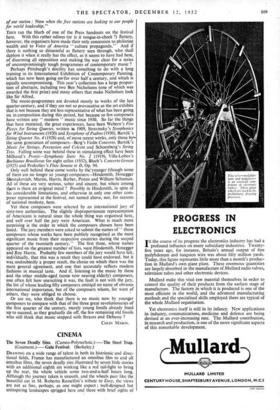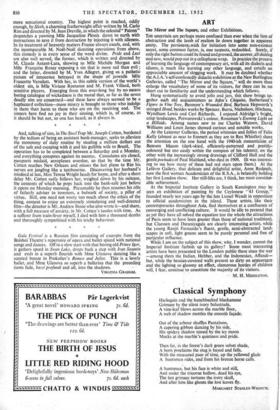CINEMA
DRAWING on a wide range of talent in both its histrionic and direc- tional fields, France has manufactured an omnibus film to end all omnibus films, the seven deadly sins illustrated by seven little stories with an additional eighth sin winking like a red tail-light to bring up the rear, the whole vehicle some two-and-a-half- hours long. Although the journey taken is smooth, and the wheels purr like the beautiful cat in M. Roberto Rossellini's tribute to Envy, the views are not as fine, perhaps, as one might expect ; well-designed but uninspiring landscapes sprigged here and there with brief sights of more sensational country. The highest point is reached, oddly enough, by Sloth, a charming featherweight affair written by M. Carlo Rim and directed by M. Jean Dreville, in which the celestial" Patron" despatches a yawning Mlle Jacqueline Plessis down to earth with instructions to save it from destruction by injecting it with idleness. In its treatment of heavenly matters France always excels, and, with the incomparable M. Noël-NoEl directing operations from above, this comedy is in every sense of the word divine. Pride and Lust are also well served, the former, which is written and directed by M. Claude Autant-Lara, showing us Mlle Michele Morgan and Mlle Francoise Rosay exposing a sin that is more sad than evil ; and the latter, directed by M. Yves Allegret, giving us a pathetic picture of innocence betrayed in the shape of juvenile Mlle Francette Vemilatt. With her, in this subtle version of the world's oldest sin, is Mlle Viviane Romance and M. Frank Villard, both sensitive players. Emerging from this over-long but by no means boring catalogue of wickedness is the moral that, as far as the seven deadly sins are concerned—and these have always seemed to be a haphazard collection—more misery is brought to those who indulge in them than harm to those who are on the receiving end. The sinners here find no joy in their sinning, which is,- of course, as it should be but not, so one has heard, as it always is.
* *.
And, talking of sins, in The Steel Trap Mr. Joseph Cotten, burdened by the tedium of being an assistant bank-manager, seeks to alleviate the monotony of daily routine by stealing a million dollars out of the safe and escaping with it and his gullible wife to Brazil. The operation has to be completed between a Saturday and a Monday, and everything conspires against its success. Consulates 4e closed, passports mislaid, aeroplanes overdue, so that by -the time Mr. Cotten reaches New Orleans and misses the last plane to Rio his nerves are jangling like a tambourine. Discovering her husband's misdeed at last, Miss Teresa Wright heads for home, and after a short delay Mr. Cotten sadly follows her, weighed down by his suitcase, the contents of which he pops back into the bank-safe just before it opens on Monday morning. Presumably he then resumes his role of fatherly adviser to investors, a bulwark of society, a pillar of virtue. Still, one need not worry too much about the ethics of the thing, content to enjoy an extremely. .stimulating and well-directed film—the director is Mr. Andrew Stone who also wrote it—and share, with a full measure of anxiety, in Mr. Cotten's tussles with time. As a sufferer from train-fever myself, I died with him a thousand deaths and thoroughly sympathised with his tetchy behaviour.
*
Gala Festival is a Russian film consisting of excerpts from the Bolshoi Theatre's repertoire of opera and ballet spiced with national songs and dances. Off to a slow start with that boring old Prince Igor, it gathers speed in Swan Lake, drops back a step with Ivan Susanin and ends in a superb flourish with Mme Ulanova dancing like a scented breeze in Prokofiev's Romeo and Juliet. This is a lovely ballet, and Mme Ulanova so superb a ballerina that the preceding items fade, bassi proftmdi and all, into the shadows.
VIRGINIA GRAHAM.



































 Previous page
Previous page